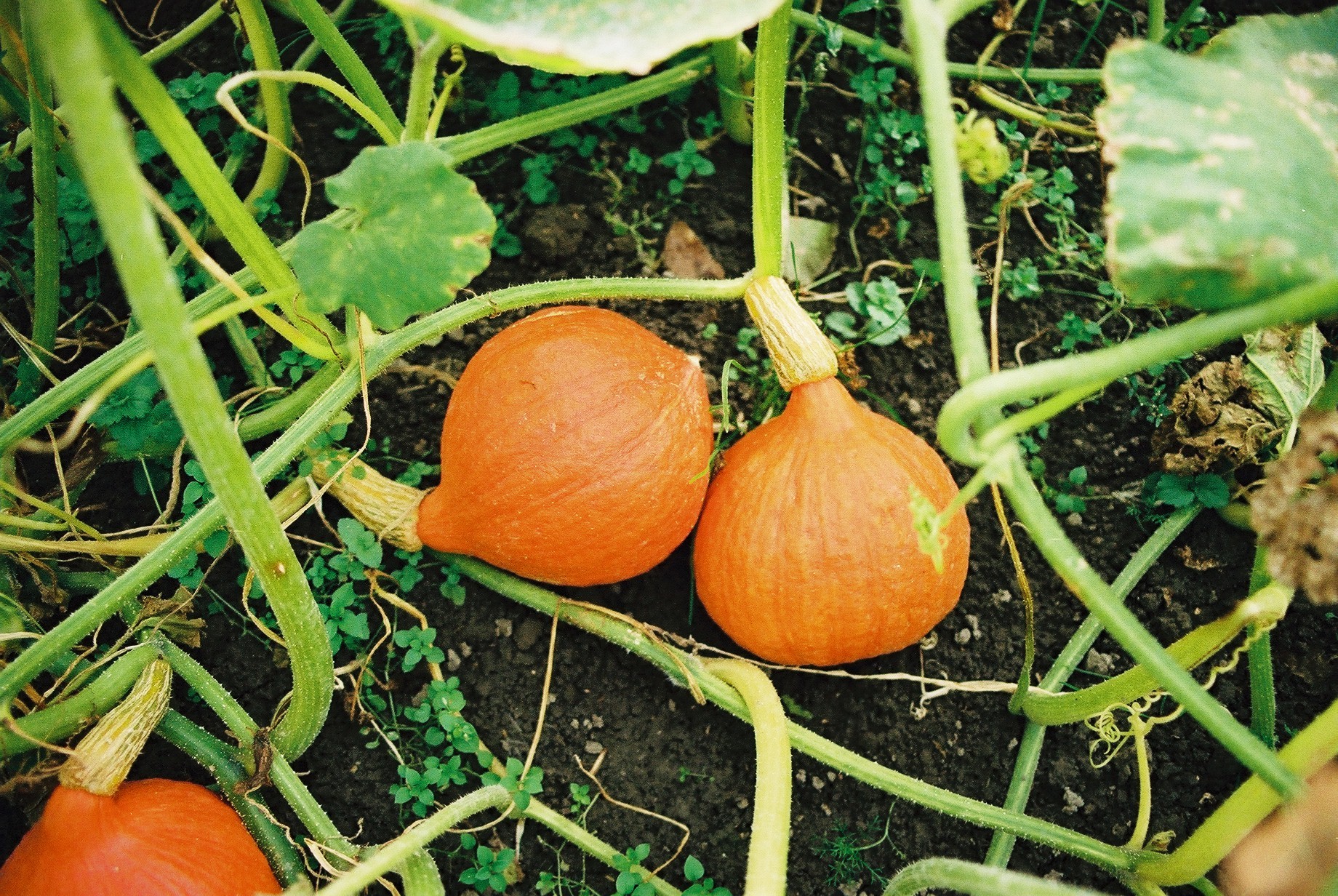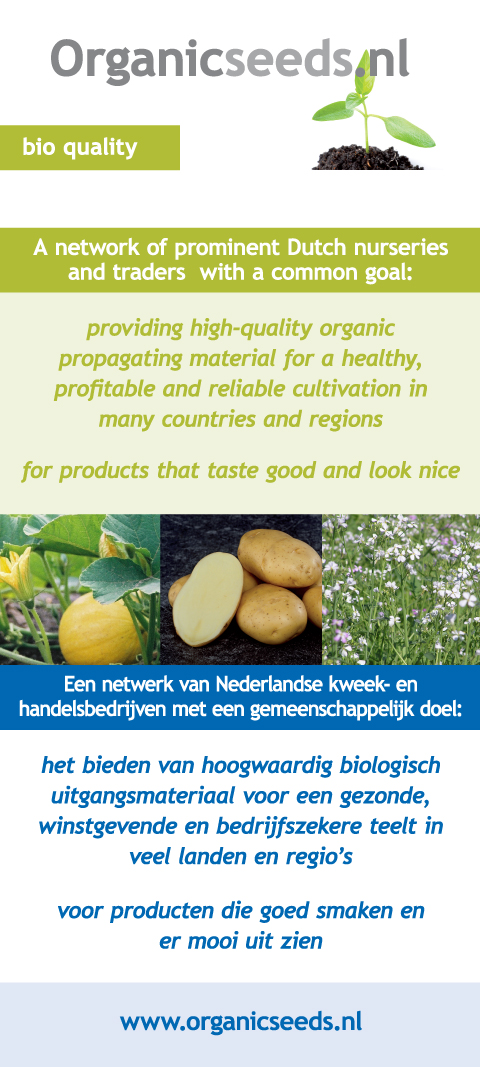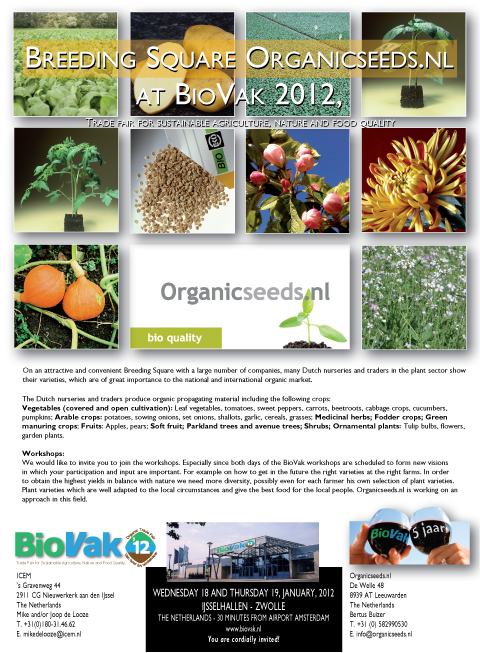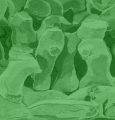Activities
Report of an excursion to demonstration fields with varieties for organic cultivation on 23 June 2008 at the Kollumerwaard experimental farm in Munnekezijl (Northern Netherlands).
June 2008
4 Spring wheat varieties were shown in 4 reruns, and 23 potato varieties.
Spring wheat
Photo: Nieuwe Oogst
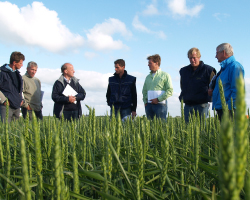
On 24 April 2008, the demonstration fields with Epos, Pasteur, Lavett and Tybalt varieties were sown. Prior to sowing, semi-liquid manure was applied. It is expected that this will result in an improved absorption of nitrogen, compared with applying semi-liquid manure at a later stage. Next to the fields with these 4 varieties is the Epos variety; a crop in transition. The lot will be organic by next year.
The experimental farm believes that the solid dung is not doing well this year as a result of the drought: plants are unable to absorb the nitrogen.
Nitrogen samples have been taken. There is 25 tons of cattle semi-liquid manure under it. Due to the drought, a limited amount of nitrogen has mineralised. The months of May and June of this year were exceptionally dry. Another piece of the lot is sprinkled (30 ml each week). 135 kg nitrogen is released there.
The wheat has been sown at a distance of 27 cm because it requires weeding to keep the crop clean. It has been weeded once this year. Currently, there is no top dressing. This should take place in this period, but because the spring wheat is in transition, proteins are not of major importance. It has a good colour so there is no need for manuring.
Agrifirm and Wiersum - Plant breeding
by Koos Kruiger (Agrifirm)
also on behalf of Ingeborg Westerdijk (Wiersum – Plant breeding)
Mr Kruiger has complimented the experimental farm because the fields with varieties are looking exceptionally good. Agrifirm requires wheat with a highly reliable baking quality, high foliage density and as little susceptibility as possible to sprouting. The baking quality is checked annually by a test baker (Cor Pool, who owns a test bakery at Harry Donker in Middenmeer), who executes tests to see which variety provides the best bread. Epos was proven to give the best bread.
The Epos variety has a high foliage density and a reliable baking quality. It also has high yields, but is extremely susceptible to sprouting and fusarium.
For a new variety for organic cultivation such as Epos and Lavett, 40,000 ha are required to ensure cultivation is profitable. This is by no means the case in organic cultivation.
New (organic) varieties have been included for research from organic into conventional. Wiersum - Plant breeding targets the improvement of spring wheat varieties for conventional cultivation. Any varieties for organic cultivation have been derived from this programme.
The Tybalt variety is susceptible to fusarium. Pasteur on the other hand has a high resistance to this spike disease. Tybalt has high yields and is resistant to mildew and yellow and brown rust of wheat. Pasteur gives yields comparable to that of Lavett. Pasteur is slightly susceptible to mildew and resistant to yellow and brown rust of wheat.
Epos is a wonderful wheat variety with high yields, even better than Lavett, but Epos is extremely susceptible to sprouting; special attention is required as regards fusarium. Epos is hardly, if at all, susceptible to yellow rust of wheat and mildew.
Lavett does not have a high foliage density and allows more light through. Due to the long stems, it allows less light to pass through than Tybalt and Pasteur, while it has an equal sowing distance. Less light stimulates weed suppression.
Wheat yields are determined by the grains per chaff part and the number of chaffs per m2. It is difficult to influence filling.
Last year, we had a thousand grain weight of approximately 30, which is usually around 50; a difference of 25% of the yield.
Susceptibility to sprouting cannot be influenced, but one can be warned about it. If the grain is in a dough stage and there is warm weather during this period in which the temperature peak is exceeded, the duration of dormancy is shortened. This can be prevented by early harvesting.
Pasteur has a high protein level, but bakes off less well. This has to be considered per region because of varying circumstances.
Potatoes
The potatoes are located on an organic lot which has been dressed with 40 tons/ha of goat manure. Despite the exceptional drought in May and June, the potatoes keep developing.
Van Rijn-KWS B.V.
by Maurice Hadders
Biogold
Biogold is a variety by Van Rijn itself. It was crossbred with ABPT material from Wageningen. Phytophthora resistance has been crossed in in this material, after which it has been crossed back to agriculturally improved potato varieties. Tens of thousands of clones originated from this, of which only one remained: the Biogold. Biogold is Van Rijn’s most important organic variety.
This is an early variety with a high Phytophthora resistance. The variety has a high yield and consumption quality. Last year’s average yield was 30 ton/ha. without any appreciable problems. The variety was allowed to be a bit more yellow and waxy for the German market. The variety scores moderately on common scab.
A constant yield is extremely important for a potato variety and Biogold complies with this aspect.
Biogold requires a relatively large amount of nitrogen and thus plenty of manuring.
Currently, there is about 30 ha of seed-potatoes. Sale takes place mainly in the Netherlands and Belgium and they are working on a market in England.
Spirit
Spirit has a good and early development of foliage. Maturity is middle-late but tuber growth takes place earlier. Spirit has been grown organically for four years; last year’s yield was 27 ton/ha. 1.5 ha increase was grown organically. This year, an increase of 3.5 ha has been planted.
Spirit has a high resistance to Phytophthora in the tuber. Susceptibility to common scab is moderate.
Inova
The Inova variety was developed by Van Rijn. Inova’s most important quality is that it is early. It has a nice tuber shape and good cooking type. Inova scores a 6 for common scab, which is slightly better than Biogold. The potato looks nice and yellow and has a good shape, but is sensitive to Alternaria. Resistance figures for Phytophthora are not exceptional. This is a commonly grown variety in Germany and is exported from Morocco and Egypt as ware potatoes. This variety provides few problems.
VR 01-316
VR 01-316 is a variety with a sleek type of foliage. By crossbreeding with ABPT material from Wageningen, it is highly resistant against Phytophthora in both foliage and tubers; it scores a 9 on both. The potato is oval and smooth and somewhat more yellow than Biogold. It scores a 7 on maturity.
Yield is good, but somewhat late. The Alternaria rate is not good. VR-013-16 scores a 6 for common scab, meaning that it is not suitable for cultivation in the area around Harlingen. The variety has been tested for 3 years.
Van Rijn has high expectations for this variety.
Satellite
Satellite is and early variety with a good quality for crisps and high yields. Gross tons are not high, but all suitable for crisps.
Conventionally, there is about 20 ha of seed-potatoes of this variety. Phytophthora resistance figures are reasonable. The variety is fairly sensitive to Alternaria.
VR 98-1111
VR 98-1111 is a homegrown variety with rapid foliage development. On average, the under water weight is approximately 370 gr. If conventional cultivation goes well this year, we have a very good variety. Through crossbreeding with ABPT material, resistance to Phytophthora is high both in the foliage as well as the tubers. AM resistance is high (ABCDE). The roots are deep, thick and firm, the tubers are rough. The variety scores a 7 for discolouration. It is a somewhat later variety.
Nicola
Nicola is a riskier variety but there is great demand for it, in Germany in particular. Last year’s consumption was bad. This variety is extremely late and yield was only beginning when Phytophthora started to set in. However, there is great demand for it. The potato has yellow flesh. Originating from a German grower, this variety is well-known from conventional cultivation.
Agrico / Bioselect
by Jacques Vergroesen
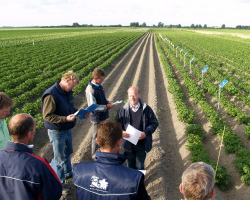
Photo: Nieuwe Oogst
Bioselect has an extensive organic improvement. The sector requires this and because Bioselect is a corporation with organic growers, it has taken on this commitment. Two organic hobby farmers are affiliated with Agrico. They hope that in the future, varieties from the organic programme can be used for conventional cultivation, which is why money is being spent on it now. Conventional varieties used to be considered for organic cultivation, but nowadays, it is tested whether organic varieties are suitable for conventional cultivation. In other words, there is a shift in trends.
Most varieties on the Bioselect experimental fields (Agria, Junior, Santé, Ditta and Raja) come from the conventional circuit.
Agria
Agria is actually the organic early summer potato, which can be used for a wide variety of applications. Good prices are guaranteed if there is a proper yield. This is a late variety with much root. As a late variety, Agria is susceptible to Phytophthora. While the yield may be 12 tons/ha one year, it may well be 30 tons the next. The advantage of the variety is that whatever potato, it is always marketable. It has various purposes: it can be used for chips, as table stock potatoes and for crisps. The variety has a fairly large acreage, both for consumption and for seed-potatoes.
Junior
Junior is an early variety that can be grubbed up in June. It is delivered to purchasers straight from the land. Junior is often grown on sandy soils.
It has been attempted to improve resistance to Phytophthora. Junior has issues with viruses. The variety has many tubers.
For about three years, there have been problems with viruses in the organic sector.
Santé
Santé is a mid-early variety that is resistant to viruses. The variety lasts long enough against Phytophthora in order to achieve good yields. The tuber type is comparable to that of Biogold. The variety is somewhat later in tuber setting, but grows a high-quality product at an early stage. Santé has been very popular for a while, but is susceptible to problems when it comes up. The variety cooks somewhat mealy, while the organic market has a greater demand for waxy potatoes.
Ditta
Ditta is a waxy potato and can be compared to the Nicola variety. Phytophthora resistance in the foliage is low, but most growers handle this well most years. Currently, there is 50 ha of seed-potatoes. Demand is exceptionally high in France, Denmark and Sweden and is high in the rest of Europe. It is the largest organic variety in Europe.
Raja
Raja has a good resistance to Phytophthora. It is not an early variety and it keeps for a long time. It is grown organically only because it is red. Very few red organic varieties are grown, while there is a demand for organic red potatoes. This variety is suitable for producing crisps. Yields are high.
Toluca
Toluca stems from the Phytophthora programme and has been especially selected for organic cultivation. The variety is very promising indeed and has a high resistance to Phytophthora in the foliage. The tuber is somewhat more sensitive to Phytophthora. This potato is pale yellow and has a beautiful shape and skin. Currently, there is 3.5 ha of seed-potatoes.
C. Meijer
by Guus Heselmans
The nursery has expanded considerably over the past few years and has a number of strong varieties in various segments. Over 12 years ago, the company started a collaboration with an organic hobby farmer Niek Vos, who selects the seedlings developed organically by Meijer. This has resulted in the ‘Bionica’.
Bionica
Bionica is a mid-early white flesh potato for the fresh-food sector. Due to its extremely high resistance to Phytophthora, this variety is also suitable for organic cultivation. Bionica has a round-oval shape, cooking type B and is suitable for frying chips at home.
Parentage: Pentland Ivory x CMK1988-169-005
Parties from both home and abroad interested in marketing this variety.
Terra Gold
Terra Gold is a table stock potato variety suitable for both organic and conventional cultivation; a mid-late variety with good cooking qualities;
Cooking type BC (rather mealy);
parentage: CMK 1987-206-001 x Fresco.
Terra Gold is a late variety with high Phytophthora resistance. The flesh is yellow and the tuber oval-shaped. The foliage slightly resembles spinach.
Melody
Melody is very suitable for the washed table stock potato market and grill market;
The variety has good cooking characteristics and shows no discolouration after cooking; it has a rich flavour and good texture;
parentage: VE 7445 x W 72-22-496;
cooking type BC (mealy);
long dormancy;
The robust plants are immune to stress and ensure a proper and harvest-secure production. Melody is a late variety and has a low Phytophthora resistance for foliage. The grade for Phytophthora resistance in the tubers is a 7.5. The variety also scores well in the conventional sector; it is very tasty, tubers are oval and flesh yellow.
Musica
Musica is a deep yellow, tasty potato with firm flesh. This variety is also of interest to growers; it has high productivity, it is mid-early and resistant to the Y-virus and a range of potato cyst nematodes (A, B, C en D). Its flesh is yellow and the tuber long and oval. This variety has reasonably low Phytophthora resistance in its foliage.
Parentage: CMK1993-042-005 x LADYCHRISTL
CMK-1999-018-011
CMK-1999-018-011 is an early variety for the crisp market with white flesh and round tubers. Phytophthora resistance for the foliage is fairly low, but nevertheless interesting taking into account that it is an early variety. A strong variety with good roots, it is sensitive to common scab.
Parentage Bonanza x Lady Jo
HZPC / Bonna Terra
by Jeroen Bakker
Annabelle
This is a waxy potato that has clearly conquered a place in Dutch supermarkets. Excellent taste and much appreciated in the German salad market because of its firmness. Organic cultivation is ventured also. A fleshy and long-oval potato, this variety is early and susceptible to Phytophthora. Very high yields are possible provided the nitrogen dose is maintained properly.
Antoinet
Antoinet is a mid-early variety with an early tuber setting and dark yellow flesh. It is suitable for the table stock potato market in north-western and central Europe. Its shape is round-oval and it does not excel in Phytophthora resistance; it is not an early variety. Organic cultivation of this variety will be ventured.
Canberra
Canberra is a red uniform potato with a smooth skin. It is very popular in Eastern and Southern Europe and is suitable for early cultivation in north-western Europe. Phytophthora resistance in the foliage is not particularly good, but it is as regards the tuber (7.5). The potato has an oval shape and is short-stemmed. Mid-early with a normal tuber setting.
Carrera
Carrera is a wonderful early primeur variety. There is a strong demand for it in the Mediterranean. Without any particular Phytophthora grades, the variety has an early tuber setting. The tubers are round-oval and fairly waxy.
Pumpkins
Pumpkins by Vitalis and De Bolster are yet to come up. The pumpkin seed with thin outer husk was the first to come up entirely with a nice and even result.
Photo: Buizer Advies
